|
Home
Terms
of Sale
New
Items
Site
Search
1847 Issues
1851-57
Issues, Stamps
1851-57
Issues, Covers
1861-67
Issues, Stamps
1861-67
Issues, Covers
Blackjack 1861-67 Covers
1869
Issues, Stamps
1869
Issues, Covers
Banknote
Stamps
Banknote
Covers
NYFM
Cancellations & Covers
Destination
Covers
Advertising
Covers
Department
Officials, Penalty Mail
Postage
Dues, Dead Letter Office
U.
S. Possessions
Machine
Postmarks
Stationery
Postal Cards
Railroad, R.P.O., Related
Civil War / Confederate States
Auxiliary Postal Markings
Stampless
Covers
Other
Items
Articles
and Analysis
Links
|
Curran Consignment (#6): Postage Due
| Item # |
Description |
Price |
Picture |
| c301 |
#J3 pair, F-VF, tiny fault, on intact cover to
Baltimore, MD. The cover was mailed unpaid from Canada as evidenced
by VF strike of "HALIFAX - N.S. CANADA B MY 8 83" postmark. The
cover was carried by non-contract steamer into Boston, MA, as
evidenced by a May 10 receiver on reverse. (Most of this receiver is
on the back flap which is intact but
pasted down within the envelope.) As such, the cover was marked
with an arched "SHIP" and "SHIP-LETTER DUE _____ CTS". It is unclear
where the ornate large "2" at upper right was applied and possibly
struck out in pencil. (None of these three markings are
documented in Blake & Davis, BOSTON POSTMARKS TO 1890.) As a ship
letter the owner of the non-contract vessel was due a fee of 2¢ for
the letter. At the post office where deposited (Boston) the letter
was charged a double 6¢ for the current (3¢) rate of postage, to
be collected at the office of delivery, the Boston PO to be
reimbursed for the ship letter fee when the doubled postage was
collected from the addressee. The letter was next sent (probably by
contract coastal steamer) to Baltimore ("BALTIMORE MD. REC'D. MAY 11
4 PM" receiver on back) where the 3¢ #J3 pair 6¢ postage due stamps
were applied. Note the pair bears a Baltimore quartered cork killer
precancel. The Baltimore PO precancelled four stamps simultaneously
by placing the cancellation at the intersection of four stamps. This
was similar to the method used for the Wheeling grid control cancels
on the 5¢ and 10¢ 1847 issues. A wonderful and very scarce
example of the use of postage dues on a ship letter. |
SOLD |
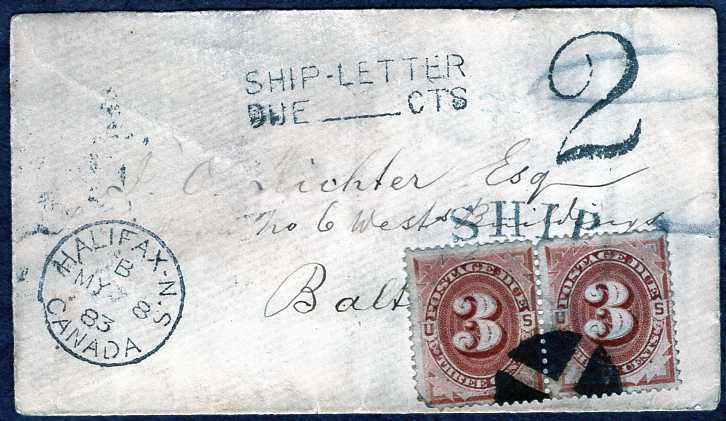 |
| c302 |
#J4, quartered cork killer, on unpaid, unreduced
envelope sent to Portland, ME, cover source not determinable.
"Ships Letter" penciled at upper right. Upon arrival and
delivery to the New York the post office, a clerk applied the
binocular "NEW YORK MAR 12 81 DUE 5 CENTS" postage due marking.
The 5¢ due rate, established July 1, 1875 for foreign countries with
which different rates had not been established by postal convention
or other arrangement, applied principally to correspondence
received from the West Indies, Central America, and countries on the
west coast of South America. It was written out in Sections 1127
and 1128 of the 1879 P.L. & R. The letter was then sent on to
Portland where "PORTLAND ME. RECD. MAR 13 12 PM" receiver and
"CARRIER MAR 14 7 AM" marking were applied on
reverse. The cover bears a red wax
seal but most of the sealed flap is missing. Scarce. |
$100$80 |
 |
| c303 |
#207, WILMINGTON DEL. FEB 188[?] postmark and ellipse
killer tie to intact cover to Baltimore, MD. The cover bears a
#J3 3¢ postage due bearing a Baltimore quartered cork killer
precancel. The Baltimore PO precancelled four stamps
simultaneously by placing the cancellation at the intersection of
four stamps. There are no specific postage due markings on the
cover, but there appears to be a crossed out pen "6" at upper left.
Nice example of the Baltimore precancel. |
$30 |
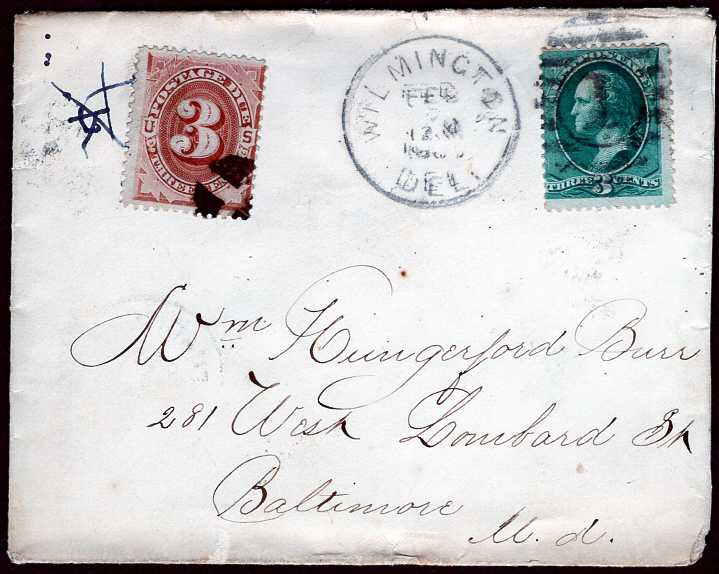 |
| c275 |
#U395, fine entire, small reduction at right,
postmarked WASHINGTON, D.C. AUG 19 1904 and bearing black straight
line "STEAMBOAT" and "DUE 2" hand stamps. The cover also bears a
#J39 2¢ postage due stamp canceled by a light magenta
WASHINGTON double oval killer. The due represents the ship
fee payment for delivery from the incoming steamboat. The cover
was delivered uncancelled, thus the D.C. postmark. The cover
contains its original letter datelined Edgewater, VA Aug 17 1904.
Based upon its content and the cover's passage via steamboat, I
believe that this "Edgewater" represents a coastal area near
Norfolk, VA and not the inland Grayson County town of this name.
A scarce and attractive later example of the steamboat mail into the
nation's capitol. |
SOLD |
 |
| c234 |
#J3, 2 XF sound copies, each with blue New
York circle of pearls precancel, on VF mourning cover
front from England. The cover has a LONDON MY 5 87 postmark
tying a one penny stamp. The London P.O. noting the deficiency
stamped its black postage due "T" and wrote a blue crayon "15"
[centimes] for the 1½ penney (3¢) postage deficiency. Upon
receipt the N.Y.P.O. placed its arched "U.S. CHARGE TO COLLECT .6"
at upper left, reflecting a penalty doubling of the deficiency, and
the two 3¢ dues. The postage due stamps are of the reddish brown
variety, a color sometimes confused with the much scarcer red brown
#J17. Indeed, this item has a 2000 APES certificate declaring the
stamps to be #J17. Students of the early postage due issues have
never seen the NY pearls precancel on #J17, issued in 1884.
Moreover, copies of #J3 with NY pearls are documented used as late
as in June of 1887. When the first class postage rate dropped to 2¢
in 1883 the N.Y.P.O. had a large inventory of the 3¢ #J3 stamps to
work through, one of the reasons that the #J17 is so scarce on
cover. Nevertheless, this is still a quite impressive postage due
item, combining good markings, attractive stamps and the late use of
the NY precancel. |
SOLD |
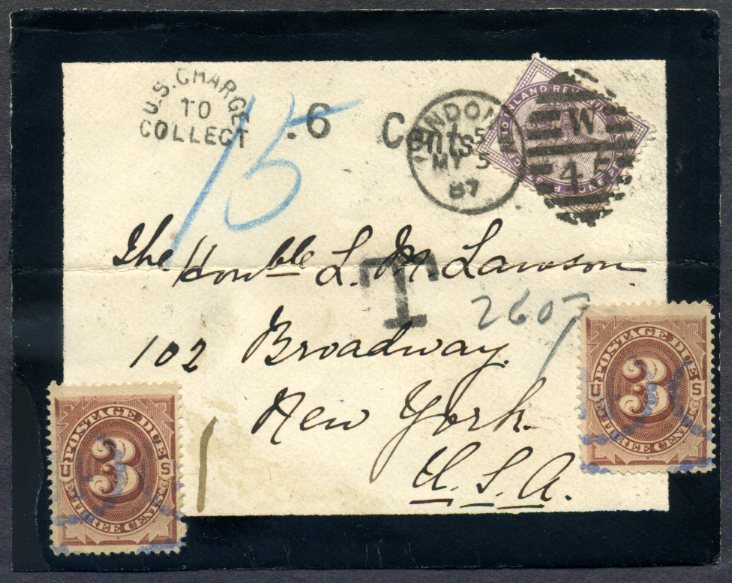 |
| c233 |
#J3, SE, perf faults, bearing a clear black letter
"C" in double oval precancel of Chicago, IL (Piszkiewicz type
PD-2) on intact cover mailed from Brooklyn, NY. The
apparently double weight cover has 3¢ postage paid by a #183 and
#206 canceled by Brooklyn ellipse killers and SEP 1 82 postmarks.
There is a black "DUE 3" in circle (a style unlisted in
Piszkiewicz) and a blue "C. & A. R.R. [Chicago & Alton Railroad]
CHICAGO. GEN. PASS. & TK'T. DEPT. SEP 5 1882" receiver on front and
a CHICAGO CARRIER SEP 3 postmark on reverse. This example of this
very scarce Chicago postage due precancel represents its latest
known use (Piszkiewicz. p.429). A terrific piece of Chicago postage
due postal history. |
SOLD |
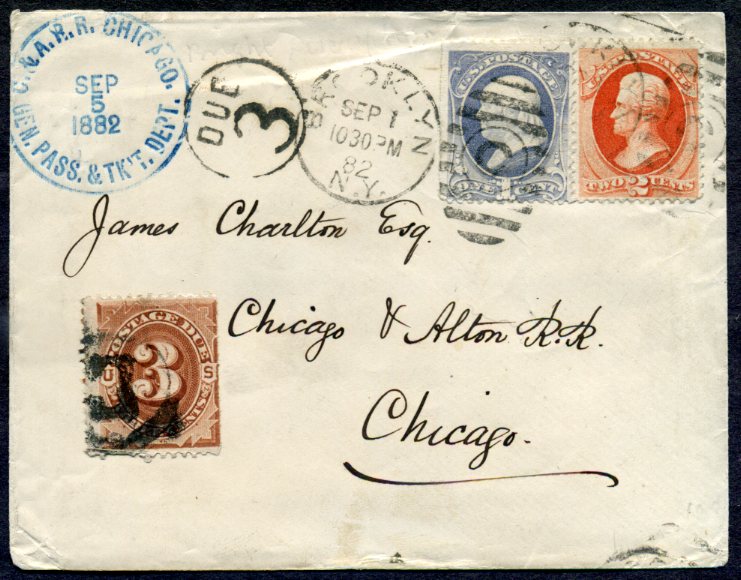 |
| c246 |
#J15, VF sound 1¢ postage due with New York circle
of pearls precancel on VF intact unsealed circular from SOCIETA
UNIONE E FRATELLANZA ITALIANA to local NY address. The due pays
the 1¢ charge for undelivered third class mail. The cover bears
an XF sound 1¢ #206 canceled by a superb strike of the
large NEW YORK (station 2) PO in barred double oval killer. Upon
failed delivery the post office added magenta strikes of "N.Y.P.O.
RETURN POSTAGE DUE ___CENTS" with blue crayon "1" and a large
"RETURNED TO WRITER CANNOT BE FOUND" pointing hand dated 1887 MAY 2.
This date constitutes a late date of use for the NY pearls
precancel (reported to be June 1887). A very attractive example
of this use of the postage due stamp. |
SOLD |
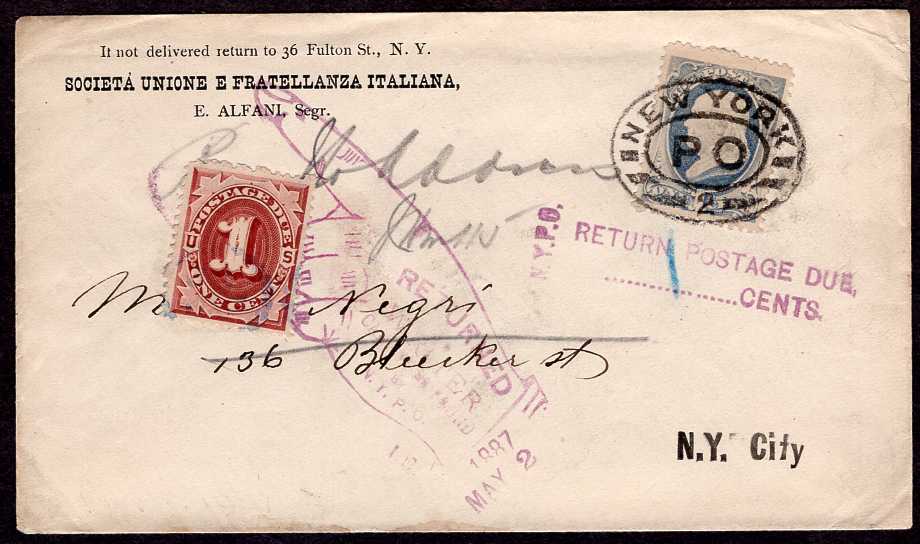 |
| c235 |
An early postage due cover with with novel
handling. #207 strip of 3 canceled SAINT PAUL MINN. AUG 24 on
cover to Philadelphia, PA. The St. Paul P.O. apparently determined
that the cover weighed 1½-2 oz. and marked it "Due 3" in blue
crayon. The cover was received in Philadelphia (AUG 26 receiver
on back) where the Philadelphia P.O. stamped the circled "DUE 3"
and the 3¢ #J3 postage due stamp was applied and canceled. How
it was paid is open to speculation. Possibly the addressee left some
funds with the P.O. for such purposes before moving, or someone at
the Philadelphia address paid it so the letter could be forwarded.
In any event, Philadelphia applied the boxed "FORWARDED" marking
and AUG 28 postmark with circled "9" killer and forwarded the letter
free of charge. To ensure that the Waterville P.O. to which it
was being forwarded would honor the paid postage, a Philadelphia
clerk circled the "DUE 3" and wrote "Paid in Phil'a P.O." along with
his signature. (The ink of the note matches that used to
re-address the cover.) I believe that there still may have been
some confusion at the Waterville P.O. (AUG 29, 1882 receiving
postmark on back). Normally the post office of delivery collects the
postage due. There is evidence in the form of gum residue and light
abrasion that another stamp (probably a 3¢ postage due) was applied
over the St. Paul postmark but then removed. Note also a penciled
"Paid" plus another signature at upper left. This fascinating cover
has minor edge faults and is missing its mail flap. |
SOLD |
 |
| c212 |
#U277 intact entire, postmark CAMBRIDGE STA. [MA], MAY
19, sent to Chicago, from where this postage due cover eventually
arrived in the Washington, DC Dead Letter Office. The cover has
multiple related markings detailing its handling ([F] front,
[B] back, [P] Piszkiewicz reference): [B] [P RC-13] CHICAGO, ILL.
REC'D. 12, 21 MAY 2 AM 1886; [B] [P p. 292] CHICAGO, ILL. S., MAY 21
7 AM 86 S in ellipse receiver at South Branch; [F] penciled "Not
There"; [B] [P p. 292] CHICAGO, ILL. S., MAY 25 12 M 86 S in ellipse
applied when cover returned to the GPO; [B] [P GD-1] magenta
boxed GEN. DEL. MAY 25 1886 3 P.M.; [F] [P AD-11] "ADVERTISED
JUN 5 =" (sound #J15 1¢ postage due precanceled with light strike
of 3 vertical bars ["Silent Precancels" Chicago G] applied for
the advertising fee); [F] [P p. 411] bold UNCLAIMED; [F]
manuscript "Returned to S. B. July 15/86"; [B] "CHICAGO [???] 15 JUL
="; [B] penciled "Stamp Collect [?]"; [B] USA DEAD LETTER OFFICE JUL
[?] triangle. A marvelous example of the processing of advertised
mail in the Chicago post office, with a scarce Chicago precancel to
boot! |
$125$100 |

 |
| c214 |
#J2x5 2¢ postage dues (strip of 3 and pair), fine,
tiny edge faults, double ruled black crayon pre-cancels, on intact
cover from Geneva, Switzerland to Worcester, Mass. ("GENEVE
EXP. LET. 16 VIII 84" postmark partially obscured by the dues).
The cover bears a 25 centime French stamp that would have been
adequate postage had the cover been mailed from France, but was
invalid for use from Switzerland. Thus the cover was treated as
totally unpaid. This is evidenced by the red crayon "0" below
the stamp applied by the Swiss postal service and the NEW
YORK AUG 30 84 DUE 10 CENTS binocular mark applied on arrival in
the U.S. The 10 cents of postage due reflects a penalty doubling
of the 5¢ UPU rate for single weight letter. The Worcester post
office applied the postage due stamps upon arrival (WORCESTER, MASS.
REC'D. AUG 31 10 PM hand stamp on reverse). A nice and quite
scarce example of the postage due treatment of invalid postage. |
SOLD |
 |
| c215 |
#J19, fine, sound 10¢ dark claret postage due,
canceled by OXFORD, MASS. MAY 5 postmark and fancy star killer on
intact cover from England. The postage due stamp pays a
penalty doubling of the 5¢ per half ounce for a double weight cover
paid only a single rate. The cover bears a faulty British 2½p
Victoria stamp canceled Manchester, AP 27 90 and a British T 25
[centime] due mark. On arrival the NY exchange office applied its
NEW YORK MAY 3 90 DUE 10 CENTS binocular hand stamp indicating the
penalty doubling of the due amount. Scarce use of an on cover
fancy cancellation of an early postage due. |
$75$65 |
 |
| c178 |
Cover from England underpaid by 1½ penny, hexagon
British T 15 due marking and NEW YORK DUE 6 CENTS DEC 12 94
binocular hand stamp, F+ sound #J24 pair on reverse, paying double
the deficiency. Cover is VF and intact with a couple sealed tears at
bottom. What makes this cover particularly interesting is that it is
a scarce, early 1894 example of mail processed in the "M.I. & R."
("Mail Inadmissible & Returnable") office, part of the Inquiry
Department of the NYPO that operated 1894-1916. Also note the the
mail was addressed to the "Post Office" so we have a General
Delivery back stamp. From research done earlier by another, I
learned that the M.I. & R. office was created to keep dangerous
(explosives and flammables, poisonous or hazardous) materials out of
the mail stream. The regulations associated with this were vague and
frequently misunderstood, and much short paid mail ended up in its
hands. Anything that a clerks was uncertain how to handle was
shunted off to the M.I. & R. office. |
$150$125
$100 |

 |
| c161 |
#J32, fine sound pair, tied by small BOSTON, MASS
letter U double oval postmark with superb strike of arched "SHIP 4"
ship letter postal marking (Blake & Davis 688, used
7/26/1864-4/21/1901) on unreduced cover from Liverpool, England
(corner), manuscript "Per Sachem" steamer directive, to Boston
merchant, BOSTON F.D., MAY 8 97 receiver on reverse. Arfken (p. 97)
notes, "A ship letter to a major port which had carrier delivery
service and addressed to that port, would be a drop letter liable to
a 2¢ charge doubled to 4¢ per half ounce." He further notes only two
such covers bearing large numeral dues have been reported,
illustrating one from this same correspondence on p. 99. A wonderful
and exceptionally scarce use of postage due irrespective of due
issue. |
SOLD |
 |
| c163 |
#J4, fine, sound, tied on VF, fresh cover to Boston,
MA by two strikes of what appear to be a muddy magenta letter "C"
or broken circle (killer unlisted in Arfken), with VF NEW YORK, OCT 25, 79 DUE 5
CENTS binocular due hand stamp. The cover originated in Haiti,
evidenced by an XF strike of large, blue DUTHIERS & TRAVIESO,
Port-au-Prince, HAITI fancy double oval firm hand stamp, and was
sent to Messinger & Sweet, a Boston match manufacturer. The cover is
docketed "via Kingston [Jamaica]" at upper left with the notation "5 cts Paid by W D. S." at bottom.
The 5¢ due rate, established July 1,
1875 for foreign countries with which different rates had not been
established by postal convention or other arrangement, applied
principally to correspondence received from the West Indies, Central
America, and countries on the west coast of South America. It was
written out in Sections 1127 and 1128 of the 1879 P.L. & R. This is
an early use of the 5¢ due to pay the deficiency on a cover from a
small, rare source country. For accuracy, it has a 7mm reduction at
right affecting nothing and a blue BOSTON, MASS. CARRIER, OCT 25
mark on back. All in all an absolutely marvelous due cover! |
SOLD |
 |
| c165 |
#J18, fine, sound, tied by small NEW YORK PO barred
double oval killer on intact cover from GERMANY. Cover bears a
defective 10pf German coat of arms stamp postmarked Dresden,
11/??/93 paying only the domestic rate. The German postal service
applied the UPU "T" (Arfken type 12) due marking and a
penciled "12½" representing the German postage deficiency. When received the NYPO applied a "COLLECT POSTAGE
.5 CENTS" (note the unusual period
before the "5"), double the postage deficiency. Ex-Warren Bower.
According to his notes this odd 5 CENT due marking is seen mostly on
Germany to U.S. letters. Attractive. |
$100$90
$75 |
 |
| c166 |
#J26, VF, sound with horizontal brush stroke precancel,
on unreduced cover from GERMANY. Cover bears a 20pf German coat of
arms stamp tied by indistinct Reinberg, 18/6/92 postmark paying the
single weight UPU rate. Upon arrival in New York the NYPO determined
that the cover was double weight and applied its NEW YORK JUN 30 A
92 DUE 10 CENTS binocular due marking before sending on to
Cleveland, Ohio where the 10¢ due stamp was applied. Cover contains
the original letter. A small portion of the back flap is torn away
affecting a CLEVELAND JUL 1 receiving postmark. Scarce precancel use
of the due stamp. |
$100$90
$80 |
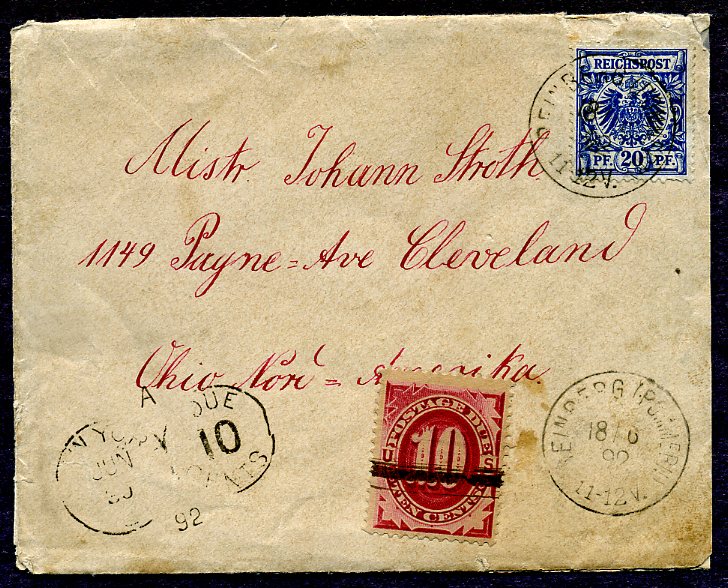 |
| c168 |
#210, fine, tied by light Zanesville, OH, FEB 26
postmark and ellipse killer on cover to Washington, DC with fine #J1
tied by bold "UNCLAIMED". The cover bears several dated WASHINGTON
postal markings documenting the processing of this cover that
eventually wound up in the Dead Letter Office: REC'D FEB 27 1886 (back); MAR 1 11:30AM 86 numeral
7 ellipse (front, lower left); GENERAL DELIVERY, MAR 1 1PM (back);
large letter L ellipse and MAR ? 1886 postmark (front, a marking
typically found on DC covers with postage due); ADVERTISED WASH.
D.C. MAR 6 1886 (front); and finally, WASHINGTON, D.C. Post Office, D.L., APR 3 1886 (back, a dead letter marking). The 1¢ due was
applied when the letter was advertised, but with no one calling for
the letter, the stamp was canceled by the UNCLAIMED hand stamp. The
cover is reduced 5mm at right with the upper right corner clipped,
all affecting nothing. A very interesting processing of an
advertised cover. |
$85$75
$65 |
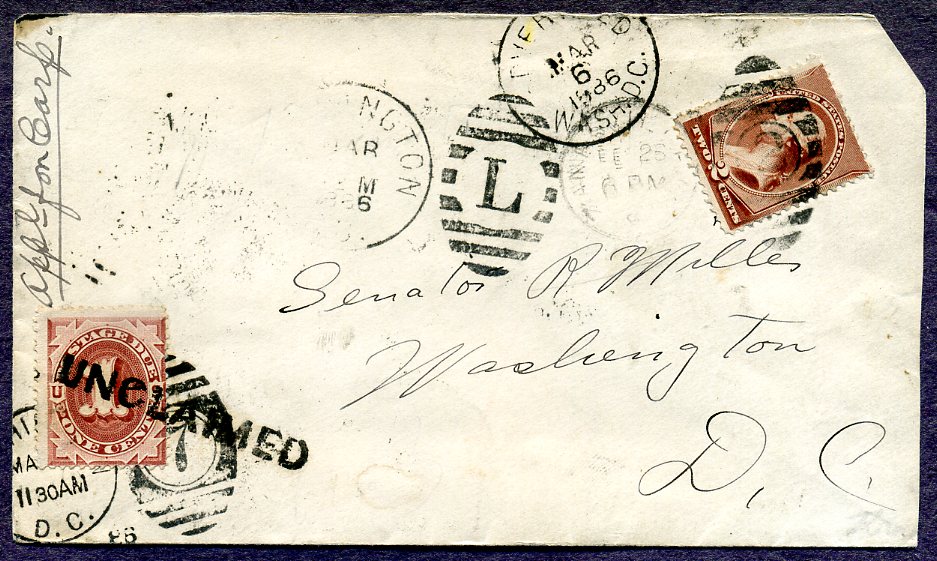
 |
| c169 |
#U163 entire, intact with tears, canceled by BOSTON
MASS JUN 25 83 5 PM time on bottom postmark and numeral 4 vertical
ellipse killer (Blake & Davis 2086 + 2128), to New York. Cover with
fair red oval JUL 6 NEW YORK POST OFFICE ADV Due 1 Cent and #J1, VF,
sound, with blue New York pearls precancel paying the advertised
fee. The entire's indicia bears a bright purple circled UNCLAIMED
I.D. and blue double oval D.S. No. 1 (directory services for
addressees letter B last name) as well as a NEW YORK I.D. AUG 18 83
back stamp. |
$75$65
$50 |
 |
| c174 |
#210, fine, sound, tied by NEW YORK NOV 21 84 postmark
and ellipse killer on VF corner advertising cover to New Haven, CT
(NEW HAVEN, CONN. REC'D. NOV 22 receiver on reverse). The cover was
apparently rated double weight on receipt, the receiving post office
applying a 2¢ #J15, canceling it with an unusual black single ring
killer. Attractive, clean postage due cancellation item. |
SOLD |
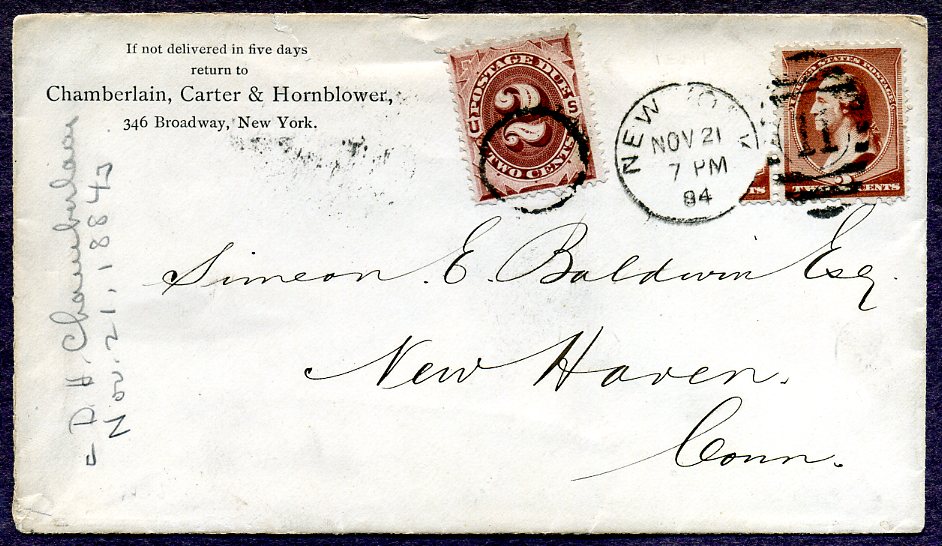 |
| |
|
|
|
| |
|
|
|
|
